________________
"Concept of Rasa" as seen in Anandavardhana and...
"gṛhṇāti datte dayate
iti karma ghṛṇer itam." (B. P. pp. 49, ibid)
Thus √ghṛn is used in the sense of compassion, giving alms, and accepting something (grahaṇa). "gṛhṇāti datte dayate iti karma".- this is the meaning of 'ghṛṇā' The wise men say that through this activity whatever is the mental attitude that results is termed "ghṛṇā". The grammarians explain "ghṛṇā" as "karuņā." So, the composers of nighņu also take 'ghṛṇa' as "karuṇā". "Karuḥ" means 'kleśa' or unhappiness. That which does not tolerate this "karuḥ" is 'karuna'. The experience of this feeling of 'karuņa' is "karuņa" (rasa). The mental attitude which does not bear or tolerate the miseries inflicted by others, is the bhāva called "karuna."
Thus 'bībhatsa' is explained from √badh, with 'san' termination. garhā, nindā, bībhatsa, kustā etc. are synomyms.
'ñi-bhi'-bhaye-means √bhi is for fear. The learned explain the word 'bhaya' as 'calana' (i.e. going away, running away). "bibheti bhāyayati anyān karmaṇā iti bhayam." That which is afraid and that which makes others afraid is termed 'bhaya.' That which is born of 'bhaya' and akrośa' is termed "bhayānaka."
Wherein changes, both external and internal get mixed and get quiet, that feeling (bhāva) is termed śānta-(Śā. pp. 50, ibid).
“ābhyantarāś ca bāhyāś ca vikārā yatra samyutāh yasya bhāvasya samyanti sa santa iti kathyate."
Śā. says that derivations of words such as 'sṛngara' and the like are attempted by him folllowing the line of etymologists who derive words either on the basis of meaning, or roots, or 'vacana', or 'yoga' or through commonness of letters etc.
1451
To us, these derivations of words does not help the cause of aesthetics and therefore, this is a totally futile exercise by Śā.
Śā. now turns to an important topic. He says that experts explain differently how the spectators experience the fact of the superimposition of Rama etc. on the
actors :
(pp. 50, ibid)
Jain Education International
"rāmādyā"ropaṇātmā dhiḥ prekṣakāṇām naṭā"diṣu jāyate yā'tra vidvadbhir bahudhā sā vivicyate."
For Personal & Private Use Only
www.jainelibrary.org




